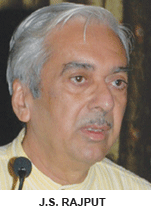Remembering Gandhian education
 JS Rajput is former director of NCERT and National Council for Teacher Education
JS Rajput is former director of NCERT and National Council for Teacher Education
On October 2 every year, the nation ritually observes the birth anniversary of Mahatma Gandhi, the extraordinary sage, savant and visionary who piloted India’s freedom movement, humbling the mighty rulers of the globe-girdling British Empire on which it was proudly claimed, the sun never set. It’s therefore a good time to remember the Mahatma and seriously ponder on how far independent India has lived up to his principles and values.
Gandhiji visualised India as an egalitarian society and a prosperous nation where everyone would have rights, dignity and self-esteem. It’s not so well known that Gandhiji believed this laudable objective could be best achieved through universal education. In South Africa, where he lived in the early years of the 20th century, he began experiments in imparting education to children of varied ethnic and linguistic backgrounds. His consistent emphasis on universal education led to the conceptualisation and development of Gandhian Basic Education or buniyadi talim. To this day, his definition of education remains intact, as dynamism was one of its inbuilt characteristics. Gandhiji himself would have replaced the takli and charkha with computers and the internet to maintain its relevance in these difficult times. Whenever there is a serious discourse on the ills that afflict India and obstruct its progress, it emerges that most of them are a consequence of neglecting Gandhian values.
Perhaps no one understood India more intensely and intimately than Gandhi who was blessed with great insight and futuristic vision. In a letter he wrote on January 24, 1922, he said: “We should remember that immediately on the attainment of freedom our people are not going to secure happiness. As we become independent, all the defects of the system of elections, injustice, the tyranny of the richer classes as also the burden of running the administration are bound to come upon us. People would begin to feel that during those (British) days, there was more justice, better administration, there was peace, and honesty to a great extent among administrators compared to the days after independence. The only benefit of independence, however, would be that we would get rid of slavery and the blot of insult resulting therefrom.”
Today the disillusionment he predicted almost a century ago is pervasive in society. However, in that very letter, he had also offered the antidote: “But there is hope if education spreads throughout the country. From that people would develop their childhood qualities of pure conduct, God-fearing love. Swaraj will give us happiness only when we attain success in this task. Otherwise, India will become the abode for grave injustice and tyranny of the rulers.” Therefore the search for solutions to combat the alarming decline in values in public life must begin with the infusion of fresh and pragmatic inputs in educational policy and integrating them with developing dynamic stage-specific curriculums.
The relevance of education, functional efficacy of the system right from preschool to university levels, the inadequacy of professional preparedness at all levels, and above all the failure to focus on ‘man-making’ education, present a discouraging picture. Admittedly, there are private schools and institutions of higher learning which excel in quality and have risen high in public esteem. But schools and universities maintained by the Central and state governments present a picture of acute decline. There’s something peculiar and incongruous about government accrediting institutions and approving private school curriculums, but unable to better its own substandard, deficient and deprived schools. The education provided in these schools is not the “ray of hope’’ that Gandhiji had highlighted in Hind Swaraj. He wanted education to draw out the best in “body, mind and spirit’’ which can’t happen in institutions with deficient and depressing teaching-learning environments.
The seeds of values inculcation are sown in the family, but they are nurtured in schools. If India has to reverse the sharp decline of values in public life and prepare citizens with character and commitment to lead the nation, it’s imperative to revisit the work culture of our schools, and more particularly of teacher training institutions. Recently, the report of a committee headed by Justice J.S.Verma, former chief justice of India, submitted to the Supreme Court, highlights that of 291 teacher training institutions it inspected in Maharashtra, only 34 are fit to conduct teacher preparation programmes. Such neglect of teacher training institutions imperils the future of India.
The prime lesson of India’s patchy national development effort of the past 65 years is that educational expansion and access are necessary but insufficient conditions for socio-economic advancement, particularly if the basic aims of education are lost in pursuits bereft of values, principles, life skills and conflict resolution. It’s also clear that government-provided education needs people’s support and participation to fill the gaps and infuse quality, relevance and respect for human values, with quality schools supporting less fortunate institutions. The goal of all educators should be to deliver universal liberal education with strong moral and ethical content.
Also read: Towards real quality education






 JS Rajput is former director of NCERT and National Council for Teacher Education
JS Rajput is former director of NCERT and National Council for Teacher Education









Add comment